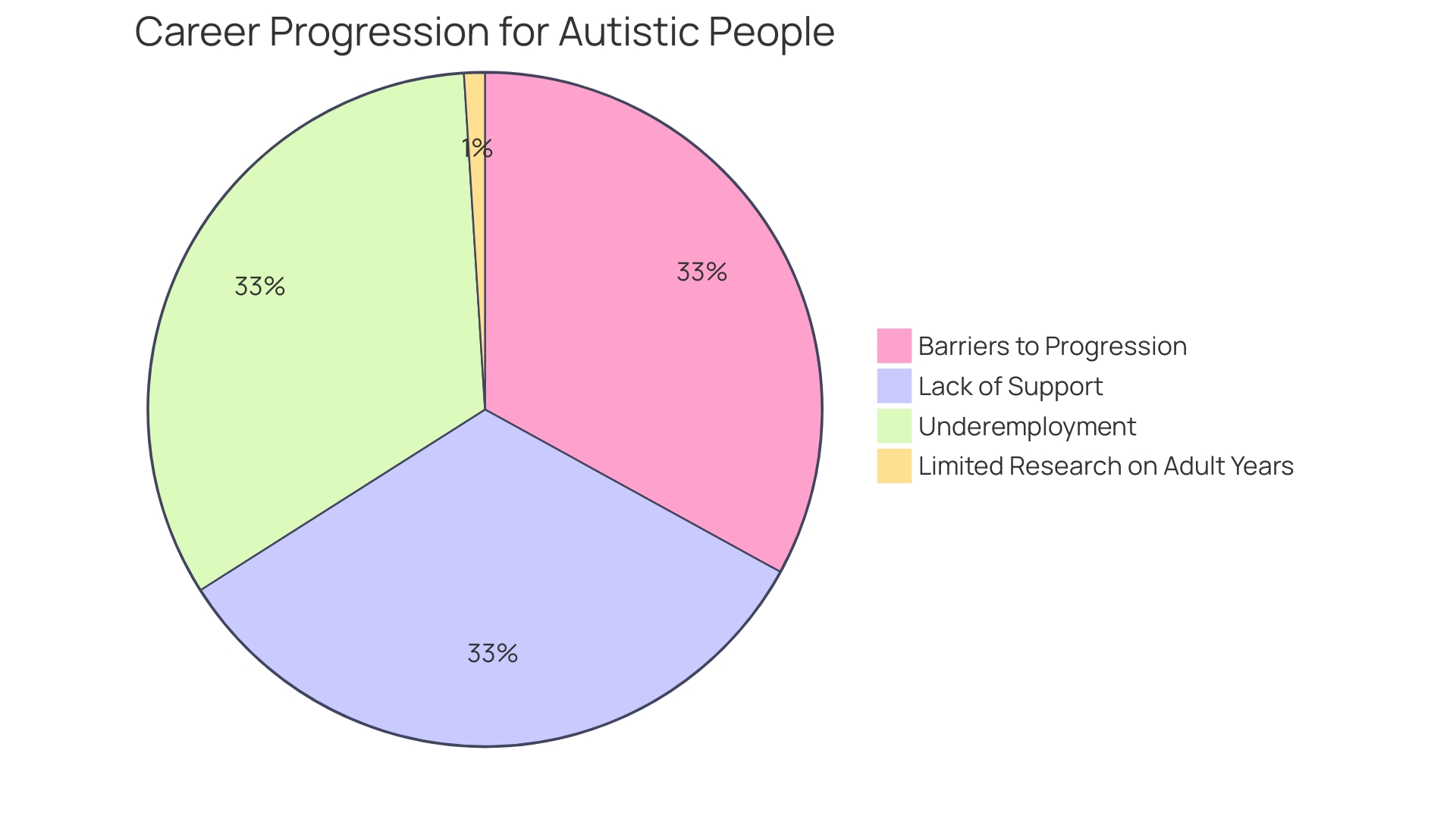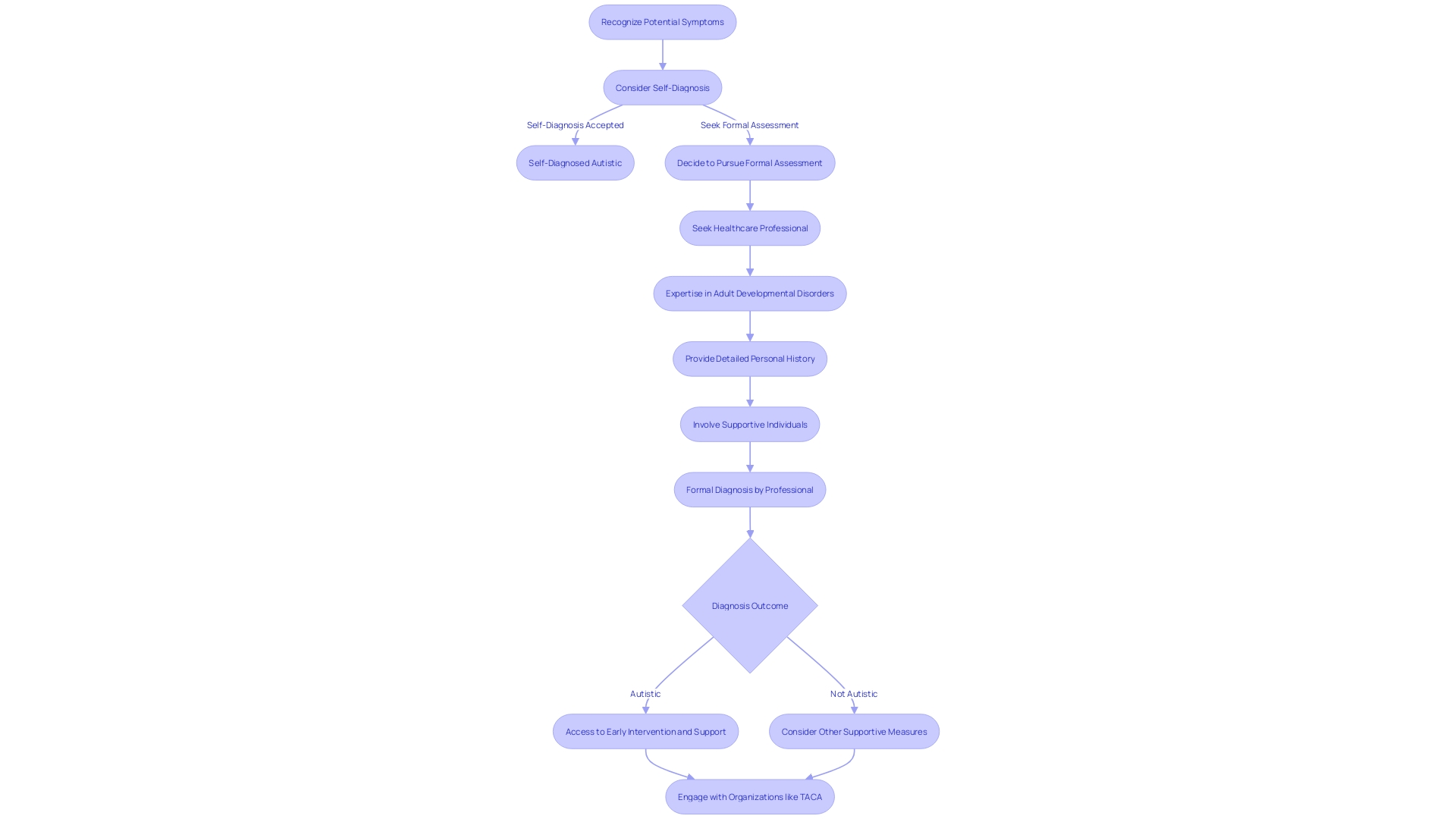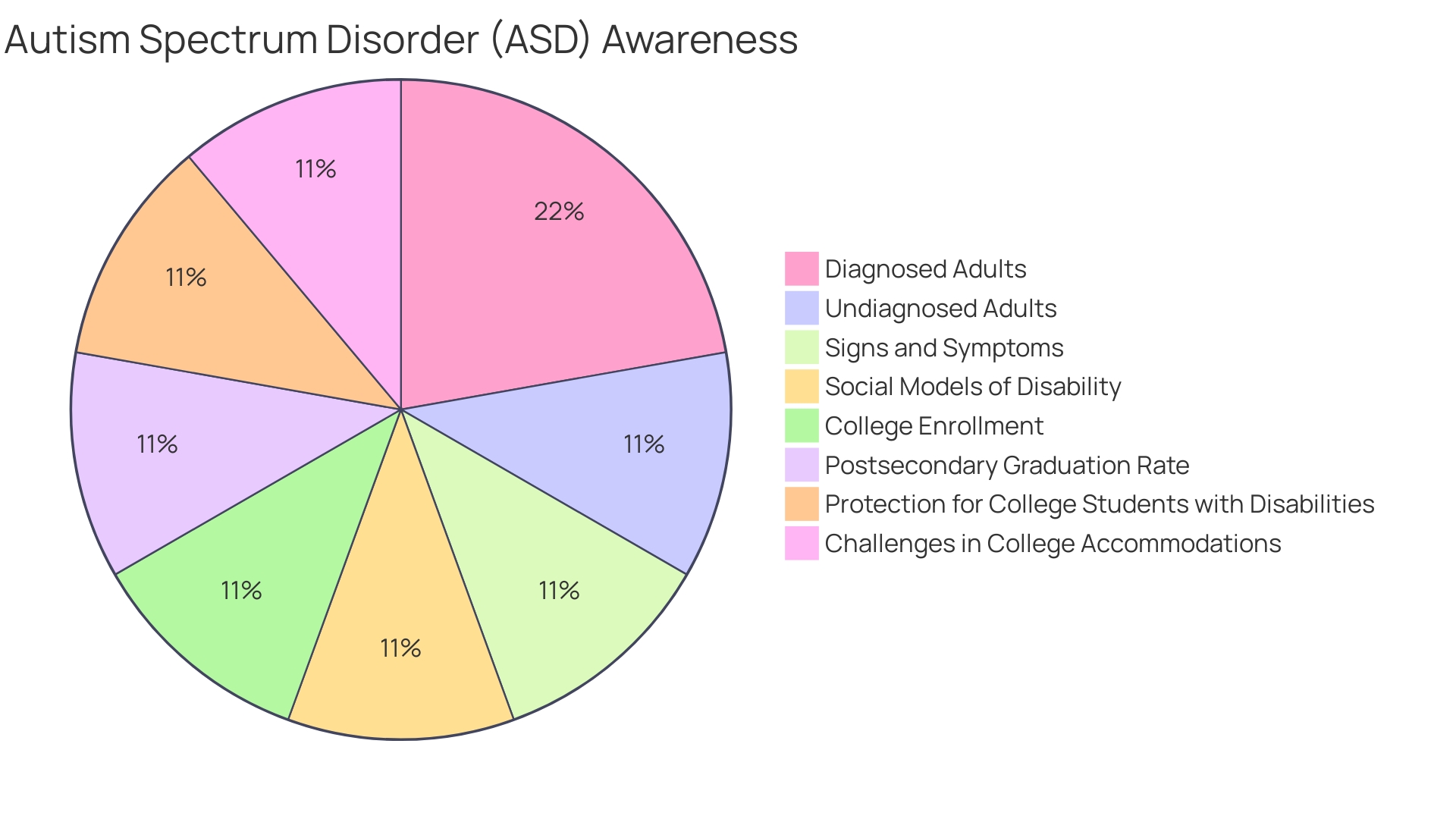Introduction
Understanding Autism Spectrum Disorder can be a complex task, especially when considering its diverse manifestations and the unique challenges faced by adult women. The intersectionality of gender, race, and disability further compounds the experiences of autistic women, highlighting the need for tailored support. Additionally, the diagnostic journey for women can be hindered by historical biases and the ability to mask symptoms.
However, with increased research and awareness, there is hope for accurate diagnoses, personalized interventions, and greater support. In this article, we will explore the nuances of autism in adult women, the challenges in diagnosing them, and the importance of seeking support and resources. By delving into these topics, we aim to empower Parent Advocates with the knowledge and tools they need to navigate the world of autism and ensure the well-being of their children.
Understanding Autism Spectrum Disorder
The manifestation of Autism Spectrum Disorder (ASD) can be especially distinctive in adult females. The spectrum nature of ASD implies a diversity of experiences and challenges, which may be influenced by societal expectations and gender norms. Grown females with ASD may participate in camouflaging, a process where they intentionally mask their autistic traits to align with social expectations. This can lead to a phenomenon known as diagnostic overshadowing, where signs of autism are missed because they present differently or are attributed to other conditions.
The intersectionality framework suggests that various social factors, including gender, race, and disability, can compound the experiences of autistic individuals, leading to unique challenges. For instance, minority stress can be a significant issue for women on the spectrum, as they navigate the complexities of a stigmatized social identity. Furthermore, neurodiversity advocates for the acceptance of a unique variation within the human experience, emphasizing the importance of neuro-affirming interventions that respect and support individual differences.
Recent studies, like the pioneering stem cell research on individuals with autism at UC San Diego, aim to unravel the neurobiological underpinnings of this condition. Researchers like Courchesne are committed to comprehending the developmental trajectory of a condition believed to start before birth. Furthermore, the examination conducted by the Drexel Institute specializing in Autism draws attention to the overlap of autism with other intellectual and developmental disabilities, particularly in relation to perinatal and postpartum outcomes.
Data shows that 1 in 45 individuals in the U.S. are diagnosed with ASD, indicating that many more may be living without a diagnosis or have been misdiagnosed. The procedure for diagnosing developmental disorder in individuals includes a thorough assessment of their developmental history, cognitive and behavioral evaluations, and self-report surveys. However, the diagnostic journey can be challenging for the female gender, due to historical bias in diagnostic criteria and the ability of some to mask symptoms.
Indications and indications of autism in grown individuals can involve difficulties with social communication and limited, repetitive behaviors. These core symptoms persist across the spectrum, regardless of gender. However, females may encounter extra internal obstacles, such as self-stigma, which includes internalized bias and worries about overt discrimination.
In conclusion, identifying the indicators of ASD in grown-up females necessitates a comprehensive strategy that takes into account the range of ASD, gender-specific encounters, and the wider societal context. With an expanding collection of studies and heightened consciousness, there is optimism for more precise diagnoses, customized interventions, and increased support for females on the autism spectrum.
Common Signs and Symptoms of Autism in Adult Women
Comprehending the intricacies of a specific developmental disorder in adult females necessitates a closer examination of regular behaviors and difficulties. Adult females with autism may navigate social interactions with difficulty, often struggling to grasp subtle cues, make consistent eye contact, or fluidly maintain a conversation. Sensory sensitivities are also prevalent, with heightened reactions to loud sounds, intense lights, or particular textures.
Furthermore, it is not unusual for individuals with autism to develop profound, specialized interests or maintain repetitive routines and behaviors, finding solace and contentment in the predictability they provide. Changes in their established routines or unexpected alterations in their environment can be particularly distressing, highlighting a need for stability.
Emotional understanding and regulation can pose additional challenges. Some women may experience a disconnect in empathizing with others or managing their own emotions effectively, which can affect both self-expression and the interpretation of others' emotional states.
Recent research has shed light on the complexity of a developmental disorder, underscoring the importance of recognizing these signs. Based on research published in Molecular Autism, the fundamental obstacles faced by individuals with autism involve difficulties in social communication and affective aspects. The study highlights the varied manifestation of the condition, with some individuals needing lifelong care and others acquiring proficient language and social abilities over time.
Clinical neuropsychologist Susan Epstein, PhD, highlights the diagnostic challenges presented by the capability of females and girls to conceal certain autistic characteristics, which can result in underdiagnosis or misdiagnosis. This diagnostic discrepancy is additionally reinforced by data indicating that anxiety disorders, which frequently coincide with the condition, are more than twice as likely to impact females compared to males, emphasizing a gendered component to mental health that requires increased focus and comprehension.
These insights into the lived experiences and clinical observations underscore the necessity for healthcare providers to be equipped with accurate knowledge for diagnosis, acknowledging the unique manifestation of autism spectrum disorder in females and the profound impact it has on their lives.

Challenges in Diagnosing Autism in Adult Women
Comprehending the indications of developmental disorder in grown-up females is a subtle procedure. Notably, women may develop strategies to camouflage their difficulties in social settings, often referred to as 'masking'. This coping mechanism can obscure the more overt symptoms of a certain condition, making diagnosis less straightforward. The condition has historically been diagnosed more frequently in males, resulting in a diagnostic criteria that may not fully capture the manifestation of this condition in females. Furthermore, females on the spectrum often experience concurrent conditions like anxiety, depression, or eating disorders, which can complicate the recognition of autism.
Recent findings indicate that the condition can appear differently across genders and throughout different stages of life. For instance, repetitive behaviors, a fundamental characteristic, may manifest uniquely in women, and emotional regulation difficulties can also differ from their male counterparts. With 1 in 45 adults diagnosed with ASD in the U.S., and with many adults potentially undiagnosed or misdiagnosed, it's clear that a deeper understanding of these gender-specific presentations is crucial.
Innovative research is making strides in the early identification of a developmental disorder. A study by Kristiina Tammimies at the Karolinska Institutet developed machine-learning models, such as 'AutMedAI', which have shown promise in identifying patterns predictive of a developmental disorder in children. Although these models are in their early stages and currently focused on children, they represent a potential future where diagnostic processes could be refined and personalized for individuals of all ages.
Statistics highlight the significance of tackling this problem: anxiety disorders, which often coexist with a certain developmental condition, impact up to 40 million American adults each year, with females having double the likelihood of experiencing them. The intersectionality of gender, mental health, and individuals with specific neurodevelopmental needs is a complex terrain that demands attention, empathy, and a tailored approach to diagnosis and support.
For those navigating this landscape, whether through self-diagnosis or formal medical assessment, the journey to understanding and embracing one's neurodiversity is personal and profound. As the conversation around a certain neurological condition continues to evolve, so too does the recognition of the diverse experiences of individuals affected by it, particularly women, and the need for a more inclusive and knowledgeable support system.
Seeking a Diagnostic Assessment
Recognizing autism in grown individuals is a intricate journey, and it's crucial to approach it with comprehension and the appropriate resources. For those exploring the possibility of having characteristics associated with a certain developmental condition, it's common to wonder about the necessity of a formal diagnosis. Within the autistic and neurodivergent community, self-diagnosis is widely accepted, especially when considering the imperfections in medical assessments that often yield inconclusive results. If a formal diagnosis isn't crucial for accessing needed support, sparing the time, effort, and expense of testing could be a reasonable path. However, some individuals opt for a formal assessment to validate their experiences, particularly when aiming to discuss their diagnosis publicly or seeking acceptance from others in their lives.
Looking for a healthcare professional or psychologist who has expertise in diagnosing developmental disorder in adults is an essential step for individuals opting for a professional assessment. When engaging in this process, it's beneficial to bring along a detailed account of personal developmental history, symptoms, and any social, communicative, or sensory challenges encountered. The inclusion of close, supportive people who can provide additional insight into your experiences can be invaluable during assessment. A comprehensive evaluation will consider both the strengths and challenges associated with the condition, resulting in a holistic understanding of the individual's distinct manifestation.
Awareness of the condition has grown significantly, yet many individuals who are older and have autism may remain undiagnosed or misdiagnosed. Identifying the indications of ASD in oneself or in another individual is frequently the initial step in comprehending potential undiagnosed ASD. The primary symptoms of individuals with the condition involve difficulties in social communication and limited, repetitive behaviors, which remain consistent throughout all age groups.
Furthermore, the importance of a timely and accurate diagnosis cannot be overstated, as it opens the door to early intervention and support. Organizations like The Autism Community in Action (TACA) are dedicated to assisting families and advocating for the development of diagnostic tools that can identify ASD as early as possible. Advances in diagnostics, like those being pursued by NeuroQure, aim to reduce the often lengthy and difficult path to an ASD diagnosis, emphasizing the urgency of early and precise identification.
Although the procedure of identifying neurodivergence in grown individuals can be intricate and not devoid of obstacles, it still stands as a crucial measure for those pursuing clarity on their cognitive differences. Professionals typically begin with an examination of the individual's developmental history, followed by an assessment of cognitive and behavioral patterns, supported by self-report questionnaires. Despite the challenges, understanding one's neurodiversity is a powerful step toward self-awareness and accessing appropriate supports.

Importance of Seeking Support and Resources
Understanding and diagnosing a developmental condition in adults, particularly in women, can lead to life-changing support and resources. For individuals navigating the complexities of autism, several strategies can be employed to enhance their quality of life:
- Support networks are vital. Engaging with support groups and online communities can offer valuable connections to those with similar experiences, fostering a sense of community and belonging.
- Therapeutic interventions, such as cognitive-behavioral therapy, can provide tools and strategies to overcome social and behavioral challenges.
- Self-care is essential for managing stress and promoting mental well-being. Activities that nurture physical and emotional health are fundamental.
- Education and advocacy empower individuals to comprehend the condition of autism deeply and advocate for broader societal acceptance and support.
Programs like the Kevin and Avonte Program, established to prevent tragic outcomes from wandering behaviors, demonstrate the positive impact of dedicated resources. This program, in conjunction with efficient state Medicaid plans, can greatly enhance the quality of life for individuals affected by the condition by facilitating access to care and services.
Awareness of the condition in grown-ups is expanding, with recent reports estimating the prevalence of autism diagnoses among children at 1 in 36. This increased awareness must extend to adult populations, where research and understanding are still evolving. The Autism CARES Act and its substantial investment have advanced our knowledge, yet the need for sustainable funding for support programs remains critical.
It is essential to recognize the neurodiversity-affirming movement, which advocates for accommodating environments rather than viewing autism as a disorder to cure. This perspective acknowledges the challenges faced by autistic individuals while promoting their strengths and capabilities.
These combined efforts—support, therapy, self-care, education, and advocacy—for a multifaceted approach to supporting autistic adults, enabling them to live fulfilling lives and contribute to society meaningfully.

Conclusion
Understanding Autism Spectrum Disorder in adult women is complex, but with increased research and awareness, there is hope for accurate diagnoses, personalized interventions, and greater support. The intersectionality of gender, race, and disability compounds the experiences of autistic women, highlighting the need for tailored support. Challenges in diagnosing autism in adult women arise from historical biases and the ability to mask symptoms.
However, recent research and innovative techniques offer promise in identifying patterns predictive of autism.
Recognizing the signs of autism in adult women requires considering the spectrum of ASD, gender-specific experiences, and the broader social context. Camouflaging and diagnostic overshadowing can make it difficult to identify autism in women. Minority stress and neurodiversity further shape their experiences.
Seeking a diagnostic assessment for autism in adults involves finding a healthcare professional experienced in diagnosing adults and providing a detailed account of personal history and challenges. Formal assessments can provide validation and support, while self-diagnosis is widely accepted within the autistic community.
Support networks, therapeutic interventions, self-care, and education and advocacy are crucial for enhancing the quality of life for adults with autism, particularly women. Sustainable funding for support programs is essential. Viewing autism as a neurodiversity-affirming movement, acknowledging challenges while promoting strengths and capabilities, is important.
In conclusion, understanding and supporting autistic women requires a comprehensive approach. With increased research, awareness, and access to resources, we can empower Parent Advocates to navigate the world of autism and ensure the well-being of their children. Embracing neurodiversity and providing tailored support fosters a more inclusive and knowledgeable society for autistic individuals.




